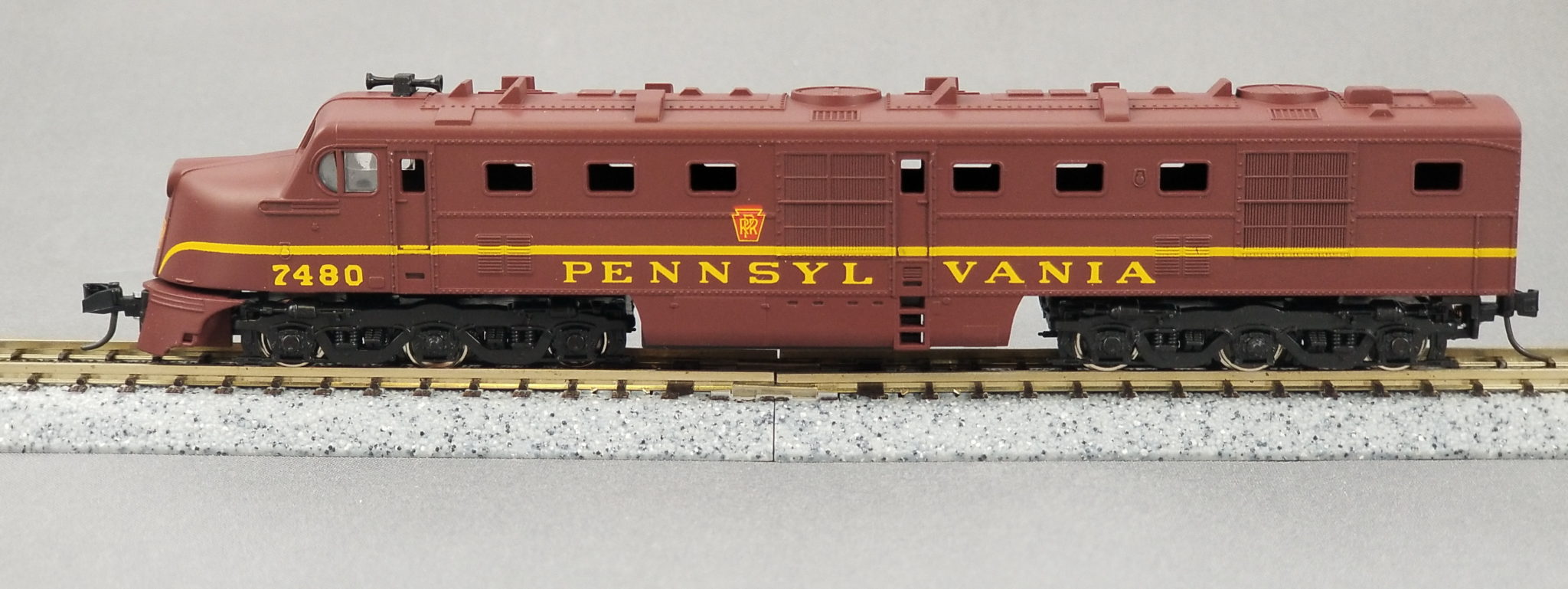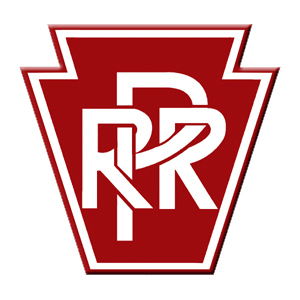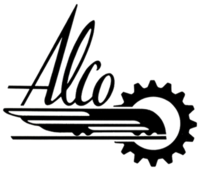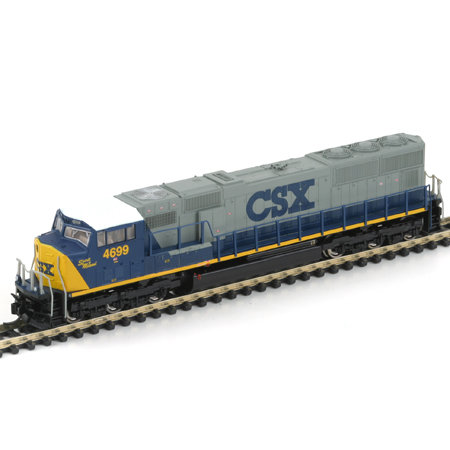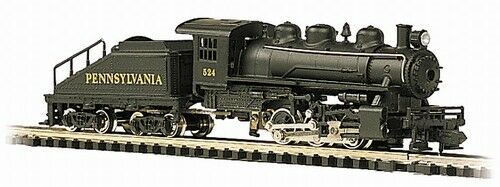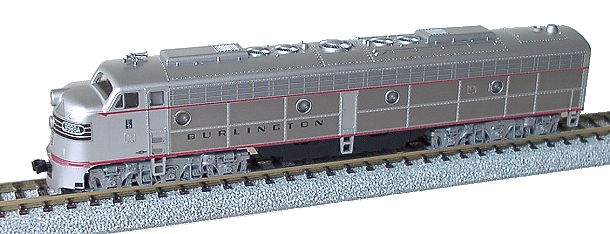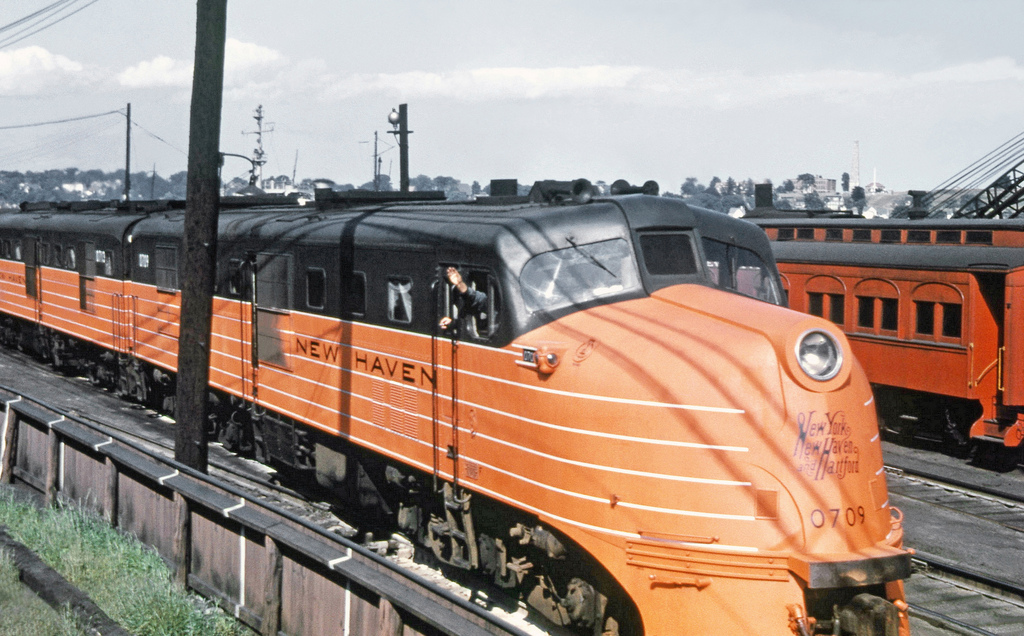Specific Item Information: Unpowered dummy engine.
Model Information: Con-Cor first released this Kato-manufactured model in 1982. In 1995, Con-Cor produced a second release, this time manufactured in China. Unlike many Chinese retoolings, this one is essentially a 'clone' of the Japanese version and if you lift off the shell you will see the mechanisms of the two are pretty similar. To determine which version you have, just check the bottom of the fuel tank (where it will say either "Made in China" or "Made in Japan").
Both mechanisms use and older design, but it works reasonably well. The motor is a 5-poler hidden inside a block of metal. The chassis consists of three pieces: one upper half and two lower halve.. All twelve wheels provide pickup and there are no traction tires, with current flowing directly from the metal truck assemblies into the electrically isolated lower frame halves without the use of wires. Apart from the metal worm gears, all the rest of the gearing is plastic. Eight of the twelve wheels are geared. Couplers are truck-mounted Rapidos. A directional headlight is wired to the front of the chassis.
As there are only negligible visual differences between DL-105, DL-107 and DL-109, Con-Cor produced only one model as DL-109 to stand in for all three types. The DL-109 was the by far the largest run of the series with a total of 62 built. Unpowered dummy "A" units with directional lighting were also available for all released road names, although no "B" (DL-110) units.
Both mechanisms use and older design, but it works reasonably well. The motor is a 5-poler hidden inside a block of metal. The chassis consists of three pieces: one upper half and two lower halve.. All twelve wheels provide pickup and there are no traction tires, with current flowing directly from the metal truck assemblies into the electrically isolated lower frame halves without the use of wires. Apart from the metal worm gears, all the rest of the gearing is plastic. Eight of the twelve wheels are geared. Couplers are truck-mounted Rapidos. A directional headlight is wired to the front of the chassis.
As there are only negligible visual differences between DL-105, DL-107 and DL-109, Con-Cor produced only one model as DL-109 to stand in for all three types. The DL-109 was the by far the largest run of the series with a total of 62 built. Unpowered dummy "A" units with directional lighting were also available for all released road names, although no "B" (DL-110) units.
DCC Information: No provision for DCC in either release.
Prototype History: The ALCO DL-109 is one of six models of A1A-A1A Diesel locomotives built to haul passenger trains by the American Locomotive Company (ALCO) between December, 1939 and April, 1945 ("DL" stands for Diesel Locomotive). They were of a cab unit design, and both cab-equipped lead A units DL-103b, DL-105, DL-107, DL-109 and cabless booster B units DL-108, DL-110 models were built. The units were styled by noted industrial designer Otto Kuhler, who incorporated into his characteristic cab (US Patent D121,219) the trademark three-piece windshield design. A total of 74 cab units and four cabless booster units were built.
Alco's DL-109 marks their early entry into the passenger diesel market in 1940. With its sleek lines, knife-edged nose and long wheelbase, it was ideally suited for high-speed service, and with 2,000 horsepower under the hood, it could handle passengers or high-speed freight with ease. Because of its dual-service capabilities, Alco was allowed to construct the DL-109 in the face of wartime restrictions on passenger-only locos, and the units performed admirably round the clock, handling passengers during the day and freight trains at night. Using lessons learned with the DL-109, it was succeeded by the PA-1 in 1946. Full data sheet on The Diesel Workshop.
Read more on Wikipedia.
Alco's DL-109 marks their early entry into the passenger diesel market in 1940. With its sleek lines, knife-edged nose and long wheelbase, it was ideally suited for high-speed service, and with 2,000 horsepower under the hood, it could handle passengers or high-speed freight with ease. Because of its dual-service capabilities, Alco was allowed to construct the DL-109 in the face of wartime restrictions on passenger-only locos, and the units performed admirably round the clock, handling passengers during the day and freight trains at night. Using lessons learned with the DL-109, it was succeeded by the PA-1 in 1946. Full data sheet on The Diesel Workshop.
Read more on Wikipedia.
Road Name History: The Pennsylvania Railroad (reporting mark PRR) was an American Class I railroad, founded in 1846. Commonly referred to as the "Pennsy," the PRR was headquartered in Philadelphia, Pennsylvania.
The PRR was the largest railroad by traffic and revenue in the U.S. for the first half of the twentieth century. Over the years, it acquired, merged with or owned part of at least 800 other rail lines and companies. At the end of 1925, it operated 10,515 miles of rail line; in the 1920s, it carried nearly three times the traffic as other railroads of comparable length, such as the Union Pacific or Atchison, Topeka & Santa Fe railroads. Its only formidable rival was the New York Central (NYC), which carried around three-quarters of PRR's ton-miles.
At one time, the PRR was the largest publicly traded corporation in the world, with a budget larger than that of the U.S. government and a workforce of about 250,000 people. The corporation still holds the record for the longest continuous dividend history: it paid out annual dividends to shareholders for more than 100 years in a row.
In 1968, PRR merged with rival NYC to form the Penn Central Transportation Company, which filed for bankruptcy within two years. The viable parts were transferred in 1976 to Conrail, which was itself broken up in 1999, with 58 percent of the system going to the Norfolk Southern Railway (NS), including nearly all of the former PRR. Amtrak received the electrified segment east of Harrisburg.
The PRR was the largest railroad by traffic and revenue in the U.S. for the first half of the twentieth century. Over the years, it acquired, merged with or owned part of at least 800 other rail lines and companies. At the end of 1925, it operated 10,515 miles of rail line; in the 1920s, it carried nearly three times the traffic as other railroads of comparable length, such as the Union Pacific or Atchison, Topeka & Santa Fe railroads. Its only formidable rival was the New York Central (NYC), which carried around three-quarters of PRR's ton-miles.
At one time, the PRR was the largest publicly traded corporation in the world, with a budget larger than that of the U.S. government and a workforce of about 250,000 people. The corporation still holds the record for the longest continuous dividend history: it paid out annual dividends to shareholders for more than 100 years in a row.
In 1968, PRR merged with rival NYC to form the Penn Central Transportation Company, which filed for bankruptcy within two years. The viable parts were transferred in 1976 to Conrail, which was itself broken up in 1999, with 58 percent of the system going to the Norfolk Southern Railway (NS), including nearly all of the former PRR. Amtrak received the electrified segment east of Harrisburg.
Brand/Importer Information: Con-Cor has been in business since 1962. Many things have changed over time as originally they were a complete manufacturing operation in the USA and at one time had upwards of 45 employees. They not only designed the models,but they also built their own molds, did injection molding, painting, printing and packaging on their models.
Currently, most of their manufacturing has been moved overseas and now they import 90% of their products as totally finished goods, or in finished components. They only do some incidental manufacturing today within the USA.
Important Note: The Con-Cor product numbering can be very confusing. Please see here in the article how to properly enter Con-Cor stock numbers in the TroveStar database.
Currently, most of their manufacturing has been moved overseas and now they import 90% of their products as totally finished goods, or in finished components. They only do some incidental manufacturing today within the USA.
Important Note: The Con-Cor product numbering can be very confusing. Please see here in the article how to properly enter Con-Cor stock numbers in the TroveStar database.
Item created by: CNW400 on 2020-07-03 13:22:07. Last edited by Alain LM on 2020-11-22 11:02:54
If you see errors or missing data in this entry, please feel free to log in and edit it. Anyone with a Gmail account can log in instantly.
If you see errors or missing data in this entry, please feel free to log in and edit it. Anyone with a Gmail account can log in instantly.


